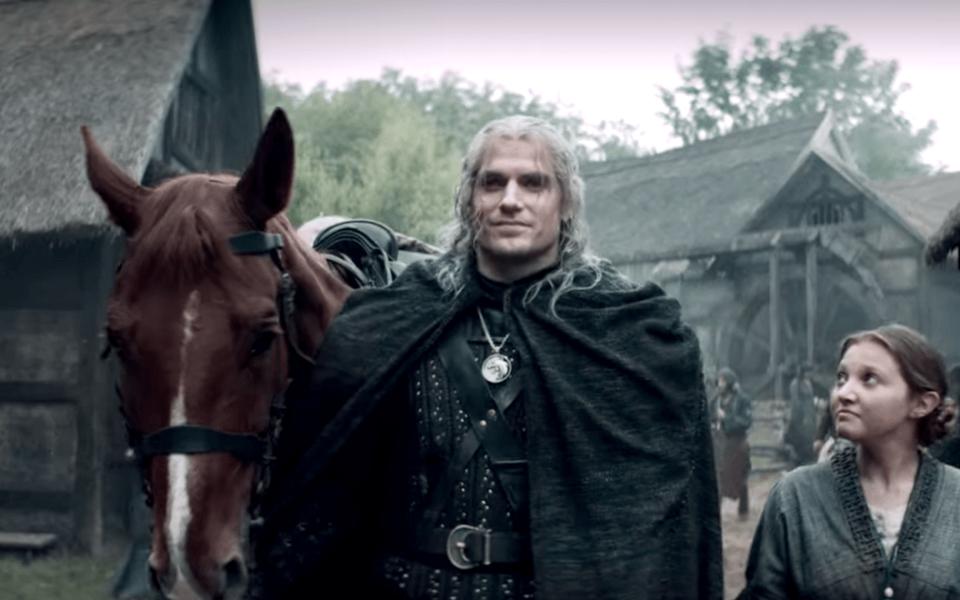Despite only having aired over two weeks ago, Netflix’s live
action adaptation of “The Witcher”surpassed “The Mandalorian” as the
most in-demand TV series in the world last month. Drawing from the original
book series by Andrzej Sapkowski, as well as elements of the beloved video-game
franchise, the medieval fantasy series is taking off, so much so that the third
Witcher video game, which came out in 2015, saw a huge jump in renewed interest
and set a new record for the game with more than 100,000 concurrent players,
the first time the game had garnered such numbers since its release more than
four years ago. So yeah, it’s kind of a big deal.
And I’m here to tell you, it’s just fine.
In the show, Henry Cavill sheds his goody-two shoes boring
persona of Superman and steps into the gruff, even-hulkier (Have you looked at
his shoulders?!) character of Geralt of Rivia, a witcher, aka a monster hunter.
The story takes place in a medieval setting that’s not
unlike Tolkien’s Lord of the Rings or even the now-disgraced “Game of
Thrones.” In fact, had it not been for the gaping cultural hole that was left
by the latter, I would argue that “The Witcher” wouldn’t have come close to
being this successful. But that’s another argument for another page.
Today, I’m going to argue for something different. And
that’s for a change in scenery in the world of fantasy.
Sure, “The Witcher” is based on books by a Polish author and
draws from a plethora of Polish folktales and mythology. That makes it slightly
more interesting. But if you hadn’t known that, it wouldn’t have been that
farfetched to assume that “The Witcher” is just another Euro-centric, white
boy-led fantasy story. Because it is exactly that.
And there’s nothing inherently wrong with that, except that
at that this point, decades and arguably, hundreds of years after the birth of
modern fantasy, it’s just kind of old. It’s boring. Banal even.
I mean, hear me out.
When Black Panther hit screens and broke records in
2018, it wasn’t just because it was a Marvel movie. It was because so much of
the story, setting and even the jokes, revolved around a different historical
and cultural context than the usual white, European or American or Canadian or
whatever, superhero film. It was new (to screen at least); it was different. And
that’s all I’m asking for.
The world is vast. There are more cultures, stories, myths and monsters to draw from than just dragons and elves and trolls.
Just this past week, Korean drama Parasite and rapper-turned-actress
Awkwafina who starred in The Farewell, made headlines for their wins at
the Golden Globes. Both related to dramatic, heart-wrenching stories. And those
are important. But why can’t we — and by “we,” I mean people of color — see
ourselves in a world full of magic and wonder?
One of my favorite shows growing up was “Avatar.” No, not
the James Cameron colonization story with blue aliens. I’m talking about the
animated show about a young boy, a monk, who has to learn to harness different
elements like air, fire, water and earth to bring peace back to his world. It
featured people of color and drew from Asian cultures and myths and built a
world so new and interesting that even I, as a high schooler, was drawn in. But
I’d like to see more live-action fantasy starring different cultures.
There’s a plethora of diverse fantasy and science-fiction
stories out there. Just look to the number of winners on book lists from years
past.
In 2016, black author NK Jemisin’s fantasy book The Fifth
Season won a Hugo Award for best novel. This past year, Gods of Jade and
Shadow by Silvia Moreno-Garcia showed up on almost every list of best
fantasy books in 2019. Right now, I’m reading The Poppy War by RF Kuang,
another frequent best-of lister.
So why don’t we have more diverse depictions of fantasy on
screen? The recent successes of movies led by and telling the stories of people
of color show that not only are they popular, they are important.
It’s 2020; we’re more than ready.
Join the First Amendment Society, a membership that goes directly to funding TCB‘s newsroom.
We believe that reporting can save the world.
The TCB First Amendment Society recognizes the vital role of a free, unfettered press with a bundling of local experiences designed to build community, and unique engagements with our newsroom that will help you understand, and shape, local journalism’s critical role in uplifting the people in our cities.
All revenue goes directly into the newsroom as reporters’ salaries and freelance commissions.


Leave a Reply